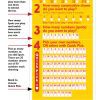Are you ready to dive into the exciting world of online poker? Wondering how to learn to play poker online? Well, you’ve come to the right place! In this guide, we’ll show you the ropes and help you become a skilled poker player from the comfort of your own home.
Poker is a strategic and thrilling card game that has been enjoyed by people of all ages for centuries. But now, with the advent of modern technology, you can learn and play poker online. It’s a fantastic way to sharpen your skills, challenge your friends, or even compete against players from all over the world.
Learning to play poker online is easier than you might think. With just a few simple steps, you’ll be ready to hit the virtual tables and start testing your skills. So, let’s get started and discover the secrets to becoming a successful online poker player!
- Research online poker websites and choose a reliable platform.
- Create an account and provide the necessary information.
- Learn the basic rules and hand rankings of poker.
- Practice playing with virtual money or join low-stakes games to gain experience.
- Watch tutorial videos and read articles to improve your skills.
- Participate in online poker communities to learn from experienced players.
- Gradually increase your stakes as you become more confident.
- Remember to always play responsibly and stick to your budget.

How to Learn to Play Poker Online?
Poker is a popular card game that has gained immense popularity in the online gaming world. Learning to play poker online can be a daunting task for beginners, but with the right guidance and practice, anyone can become a skilled player. In this article, we will delve into the intricacies of playing poker online and provide you with valuable tips and strategies to enhance your gameplay. Whether you’re a novice player or looking to improve your skills, this comprehensive guide will serve as a stepping stone to your success in the virtual poker world.
1. Understanding the Basics of Poker
Before diving into the world of online poker, it is essential to have a solid grasp of the game’s fundamentals. Poker is a card game played with a standard deck of 52 cards, and the objective is to create the best hand or to bluff your opponents into folding. Familiarize yourself with the various hand rankings, such as Royal Flush, Straight Flush, Four of a Kind, Full House, Flush, Straight, Three of a Kind, Two Pair, One Pair, and High Card. Learning these rankings will help you understand the value of your hand and make informed decisions during the game.
Practice playing poker with friends or family members to gain hands-on experience and become comfortable with the rules and mechanics of the game. There are also numerous online tutorials, videos, and resources available that can provide valuable insights into the game’s different formats, strategies, and concepts. Take the time to study these resources and implement the strategies in your gameplay to refine your skills.
2. Choosing a Reputable Online Poker Platform
Selecting the right online poker platform is crucial for a smooth and enjoyable gaming experience. Consider factors such as the platform’s reputation, user reviews, security measures, variety of games, and available payment methods. Look for platforms that are licensed and regulated by reputable gambling authorities to ensure fair gameplay and the safety of your personal and financial information.
One popular online poker platform is PokerStars, which offers a wide range of game variations and has a large player pool, making it easier to find opponents at any time. Other notable platforms include 888poker, PartyPoker, and GGPoker. Each platform has its unique features and strengths, so research and choose the one that aligns with your preferences and goals as a player.
3. Mastering Online Poker Strategies
To become a successful online poker player, it is essential to develop and implement effective strategies. Familiarize yourself with various poker strategies such as tight-aggressive play, loose-aggressive play, and passive play. Each strategy has its advantages and disadvantages, and understanding when and how to use them will significantly impact your success at the virtual poker tables.
Additionally, study the concept of position and its significance in poker. The player’s position in a hand determines their order of play and can greatly influence their decision-making process. Playing aggressively in late positions and conservatively in early positions can give you a strategic advantage over your opponents.
Moreover, practice and refine your skills by participating in online poker tournaments and cash games. Tournaments offer the opportunity to compete against a large player pool and potentially win significant prizes, while cash games allow for more flexibility in terms of time commitment and gameplay style. Optimize your gameplay by analyzing your hands, studying the strategies used by successful players, and continuously learning from your experiences.
Additional Tips for Learning to Play Poker Online
Now that we have covered the basics of learning to play poker online, let’s explore some additional tips that will further enhance your journey:
1. Manage Your Bankroll
It’s crucial to set a budget for your poker endeavors and stick to it. Avoid chasing losses or playing with money you can’t afford to lose. Responsible bankroll management is essential for long-term success in online poker.
2. Take Advantage of Bonuses and Promotions
Online poker platforms often provide bonuses and promotions to attract new players and reward loyal ones. Take advantage of these offers to boost your bankroll and extend your playing time.
3. Practice Patience and Discipline
Poker is a game of skill that requires patience and discipline. Avoid making impulsive decisions or getting emotionally invested in the game. Stay focused and make calculated moves based on the information available.
In conclusion, learning to play poker online may seem challenging at first, but with dedication, practice, and the right strategies, anyone can become a proficient player. Remember to understand the basics of the game, choose a reputable online platform, master various strategies, and implement proper bankroll management. Additionally, practice patience, discipline, and continuously educate yourself to evolve as a player. Now, it’s time to embark on your poker journey and experience the excitement of the virtual felt!
Key Takeaways: How to Learn to Play Poker Online?
- Start by learning the basic rules and hand rankings in poker.
- Practice playing poker online with free games or low-stakes tables.
- Watch tutorials or read guides to understand different poker strategies.
- Join online poker communities to learn from experienced players.
- Participate in online poker tournaments for real-life practice and experience.
Frequently Asked Questions
In this section, we will answer some commonly asked questions about learning to play poker online. Whether you’re a beginner or looking to improve your skills, these answers will help you get started on your poker journey!
1. How do I choose the right online poker platform to learn and play?
When selecting an online poker platform, there are a few important factors to consider. First, ensure that the platform is reputable and licensed. Look for reviews and ratings to gauge its reliability. Secondly, check for a variety of poker games available to suit your preferences and skill level. Whether it’s Texas Hold’em or Omaha, having options helps you learn and enjoy the game.
Additionally, consider the player traffic on the platform. The more players, the more opportunities you’ll have to play and learn from different opponents. Finally, review the bonuses and promotions offered by the platform. Some platforms provide welcome bonuses or loyalty rewards, which can enhance your learning experience. By considering these factors, you’ll be on your way to choosing the best online poker platform.
2. How can I learn the rules and strategies of poker?
To learn the rules of poker, start by studying the basic hand rankings and game mechanics. Understand the value of different poker hands and how the game progresses with each betting round. Once you have a grasp of the fundamentals, practice playing free online poker games or participate in low-stakes games to gain practical experience.
When it comes to strategies, begin with understanding position and starting hand selection. This will help you make more informed decisions during gameplay. Study fundamental concepts like pot odds, implied odds, and bluffing techniques. There are numerous online resources, tutorials, and video content available that delve deeper into poker strategies. Remember, practice and experience are key to improving your poker skills.
3. Are there any poker training sites or courses available for beginners?
Yes, there are several reputable poker training sites and courses available specifically designed for beginners. These resources provide comprehensive lessons, tutorials, and interactive exercises to help you learn at your own pace. They often cover topics ranging from basic rules to advanced strategies.
Some training sites even offer hand analysis tools or allow you to play against expert bots to sharpen your skills. Take advantage of free trials or demo versions to find the training program that suits you best. Whether you prefer structured courses or learning through interactive experiences, these training sites can be a valuable tool for beginners to improve their poker game.
4. How can I manage my bankroll while learning to play poker online?
Bankroll management is crucial when learning to play poker online. Begin by setting a budget for your poker activities and stick to it. Avoid risking more money than you can comfortably afford to lose. As a general rule, it’s recommended to have at least 20-30 buy-ins for the stakes you play. This helps ensure you have enough cushion to weather downswings.
Discipline is key when it comes to bankroll management. Avoid chasing losses and resist the temptation to play at higher stakes until you have the necessary experience and bankroll size. By managing your bankroll effectively, you’ll be able to play with confidence and focus on improving your skills without undue financial stress.
5. Are there any online communities or forums where I can interact with other poker players?
Absolutely! There are vibrant online communities and forums dedicated to poker where you can connect with fellow players, discuss strategies, and share experiences. These communities provide valuable insights, tips, and even hand analysis from more experienced players.
Popular online poker forums often have sections specifically for beginners, offering guidance and support as you learn the game. Engaging with these communities not only allows you to gain knowledge but also helps you build connections with like-minded players. So don’t hesitate to join these communities and become an active participant in the exciting world of online poker!
How to Play Poker for Beginners ♠️ PokerStars Learn
Summary
Playing poker online can be fun and exciting, and there are a few key steps to get started. First, choose a reputable online poker site and create an account. Next, take advantage of free tutorials or practice games to learn the rules and strategies of poker. Start with lower-stakes tables to build your skills and confidence before moving on to higher-stakes games. Remember to manage your bankroll wisely and set limits on your playing time. Lastly, practice and patience are essential to improving your poker skills over time.
In summary, learning to play poker online involves selecting a reliable site, practicing through tutorials and free games, and gradually increasing the stakes as you gain experience. It’s important to be disciplined with your bankroll and time, and to keep practicing to enhance your skills. So, grab your virtual chips, have some fun, and may the best hand win!









